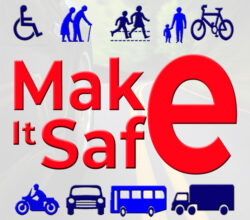Bicyclists and pedestrians experience unique safety challenges. They lack protection in a crash, travel slower than motor vehicles, and are hard for drivers to see – particularly by truck and bus drivers. The following tips will help bicyclists and pedestrians make a plan for sharing our roads safely.
Avoid Lingering in Blind Spots
Large vehicles have huge blind spots, making it difficult for drivers to see bicyclists and pedestrians. Avoid riding or walking behind a truck or bus that is reversing; drivers often cannot see directly behind their vehicle.
Prepare for Wide Turns
Trucks and buses don’t maneuver as easily as smaller vehicles and need to make wide, careful turns. If a large vehicle is stopped at an intersection or about to turn right, wait for them to turn before continuing your journey and step back from the curb to be safe.
Be Aware of Long Stopping Distances
Large trucks and buses need up to 220 meters to safely stop. Bicyclists should avoid merging closely in front of a moving truck or bus.
Make Yourself Visible
In the daytime, bright clothing is best for visibility. At night or during bad weather, wear reflective clothing, use reflectors and lights on your bike, and carry a flashlight and/or wear a headlight while walking.
Obey Traffic Laws, Signals, and Signs
Bicyclists must stop at red lights and stop signs, and should ride with the flow of traffic. Pedestrians should obey signals and cross at junction and pedestrian crossings.
Stay Alert and Undistracted
Using headphones can leave a bicyclist or pedestrian unable to hear sirens, horns, and other warnings. Stop walking while actively using a device. When in motion, make sure your device is put away and pay attention to safety.
Avoid Riding or Walking Impaired
Alcohol decreases motor skills and judgment whether you’re driving, on a bike, or walking. If you’ve been drinking, get a safe ride or take public transportation.
![]()
